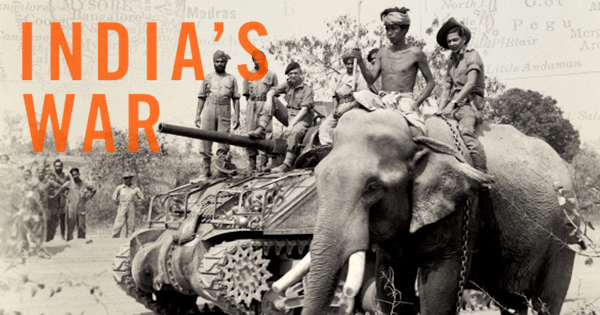
Every year, a whole library’s worth of books are published about the Second World War, from biographies of Stalin to lengthy studies of obscure Italian corps and tank models. But in more than half a century, only a few have been written about India’s role in the conflict—especially astonishing since by war’s end the Indian army had become the largest volunteer force, at 2.5 million men.
Srinath Raghavan’s new book, India’s War: World War II and the Making of Modern South Asia, is a comprehensive history of how the war changed the Subcontinent—and laid the foundation for India’s eventual independence from British colonial rule.
Modern South Asia remains a product of the Second World War. The Partition of India might have been inconceivable without the stances and policies adopted by the Raj, the Congress and the Muslim League during the war. Equally important was the sundering of India’s links with its eastern neighbors. The ‘Great Crescent’ stretching from Bengal to Singapore via Burma, Thailand and Malaya, was shattered by the devastation of Burma in war and by Britain’s unwillingness to invest in its reconstruction in peace. As Burma embarked on a prolonged period of introversion and international isolation, India’s geographical and economic, cultural and strategic links with South-East Asia were broken. The cumulative impact of these developments, against the backdrop of the emergent Cold War, put paid to Nehru’s vision of India as a regional hegemon that could don the mantle of the Raj. India’s strategic horizons narrowed to its immediate borders and it proved incapable of exerting any real influence in the Persian Gulf, East Africa or South-East Asia. Instead, India had to fall back on claims to solidarity with, and leadership of, the still-colonized countries—and subsequently the Third World and non-aligned nations.
Not all the consequences of India’s war were deleterious. Popular mobilization during the war led to a widening of the political horizons of the Indian peoples. Ideas of freedom and democracy, social and individual rights seeped into the discourse—not just of the elite but also of the marginalized. This underpinned the subsequent decision of the Indian Constituent Assembly to adopt a universal adult franchise and provide for economic and social as well as political rights. The war also left a deep economic imprint on independent India. Progressive taxation and public distribution systems were among its lasting legacies. Wartime measures and ideas also enabled the post-war state to play a prominent role in planned economic development—by import-substituting industrialization, by focusing on basic and heavy industries, by a range of controls on the economy, and by deficit financing. If India is today regarded as a major ‘emerging economy’, it is worth remembering that the roots of this transformation stretch all the way back to the Second World War.
Perhaps the most pressing reason to recall India’s Second World War is geopolitical. Today India stands again at the center of an Asia whose eastern end is unsettled by the rise of a new great power and whose western end is in the throes of ideologically driven turmoil. To be sure, the situation now is very different from that of the early 1940s. Yet India is seen as a key player in ensuring a balanced regional order in East Asia. And India’s own dependence on oil, as well as the presence of a large diaspora, impels it towards a more active role in stabilizing the Middle East. Yet if India is to revert to its older role as the ‘pivot’ of Asian security, it will first have to aim at the economic and strategic integration of the subcontinent: both to its west with Pakistan and Afghanistan and to its east with Bangladesh and Burma. Only then can the rise of India—prefigured in the Second World War—be fully realized.
Excerpted from India’s War: World War II and the Making of Modern South Asia by Srinath Raghavan. Copyright © 2016. Available from Basic Books, an imprint of Perseus Books, a division of PBG Publishing, LLC, a subsidiary of Hachette Book Group, Inc.

